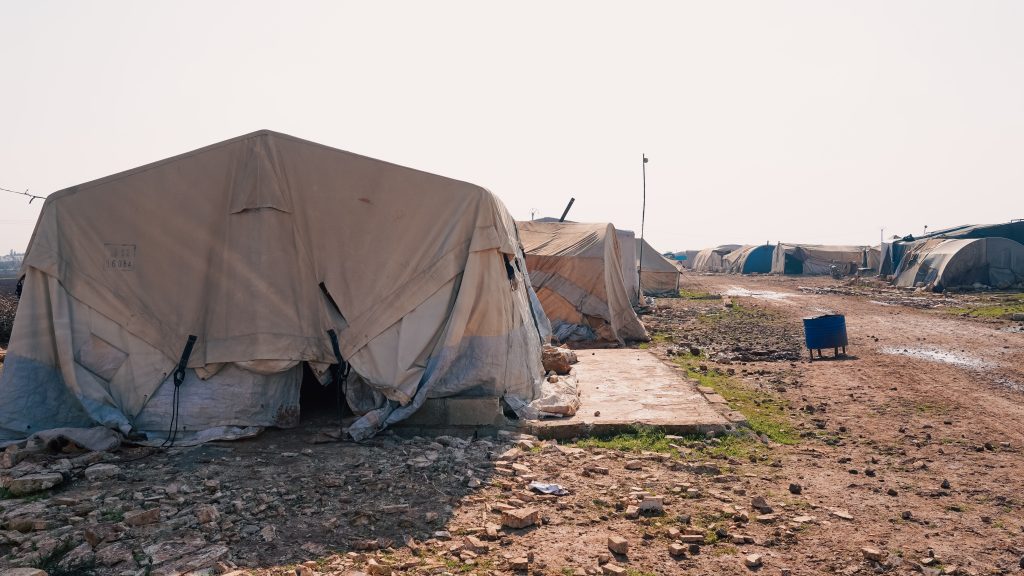By Alison Brettle

Photo: January 2023: Syrian refugee tents near the Syrian-Turkish border. Credit: Shutterstock/Mohammad Bash.
In the 12 months since Russia invaded Ukraine, nearly 8 million Ukrainians have fled the country, seeking refuge in Europe. Approximately another 6 million have been internally displaced. The attention of European policy makers is, understandably, focused on this particular emergency and in helping Ukrainian refugees settle, but they are not the only ones who need help. In 2022, 103 million people worldwide were forced to flee war, violence, and persecution.[1] The numbers are stark. But what happens when attention, money, and interest wane? These people don’t just ‘fade away’.
As part of the Cross-Border Conflict Evidence, Policy and Trends (XCEPT) research programme, I have spent the last four months working with a group of ‘forgotten’ refugees: Syrian ex-military officers who now live in Turkey. This research is ongoing, but so far 15 ex-Syrian military officers residing in Turkey have participated in a mix of virtual interviews and online questionnaires. The focus of my research is on how experiences of conflict impact the leadership style of political and military leaders, from both state and non-state armed groups, and whether this foments violent or peaceful behaviour. My research has, however, also shed light on how these men experience refugeehood, and how this can contribute to instances of conflict trauma and mental health problems.
“Life was good at first … but these days it has become very difficult”
The men with whom my team and I have been conducting interviews were high-ranking military officers, who deserted the Syrian Army and fled to Turkey almost a decade ago. They now navigate an increasingly unwelcoming and hostile environment, intensified by the human, economic, and political toll caused by the recent earthquake. A downturn in the Turkish economy that started in 2018, and was exacerbated by Covid, has seen tensions develop between refugee and local communities, with neighbourhoods reporting they have a ”refugee problem”.[2] As one interviewee put it “Life was good at first [in Turkey] but these days it has become very difficult.”[3] It is a pattern that is all too familiar. Citizens of a host country become more unwilling to provide for refugees as the number of them, and the length of time they remain in the country, increases.[4] A 2022 survey found that 66% of Turks think Syrians should return to their homeland.[5]
Many have perceived an increase in levels of discrimination faced by refugees. This can be physical harassment, such as being called derogatory names, but was also described as ‘racist discrimination’, for example, in instances where Syrians have been denied job opportunities because of their nationality. A common theme that emerged from interviews was the worry that the Turkish regime was attempting to make life so “uncomfortable”[6] that Syrians would feel they had no choice but to leave. The arbitrary arrest and deportation of hundreds of Syrian refugees from Turkey to Syria in October last year only increases these very real fears.[7] One interviewee stated bleakly that his foremost concern was the Turkish authorities “forcing immigrants to return to the system of murder, corruption, poor education, poverty and bad morals [in Syria].” As defectors, they fear that if they return to Assad-controlled territory, they will face death or imprisonment.
Now, in the aftermath of the earthquake, anti-Syrian sentiment is reportedly rising, with Syrians being accused of looting and other criminal acts.[8] Given that tensions between Syrian refugees and Turkish authorities and communities are already high, there is a fear that, as grief turns to anger, Syrians are increasingly becoming scapegoats.
Living as refugees
Alongside these fears are the concerns brought about by day-to-day life as a refugee. Just as Turkish citizens are facing economic difficulties, so too are Syrian refugees. When they first arrived, these former high-ranking members of the Syrian military lived in ‘officers camps’ in Hatay province, close to the border with Syria – a space where the sounds and sights of the war, as well as the country they had fled, were still very much in evidence. In the camps, food and accommodation were provided, and they were afforded a close-knit community where social ties were maintained with fellow Syrian military personnel.[9] When the camps were disbanded, it signalled an unwillingness on the part of the Turkish authorities to accommodate the refugees, and it forced residents to move into Turkish communities. In many of these areas, tensions between the two communities have spilled over into violence.[10]
Life is now a daily struggle because of the high cost of living and very limited job opportunities. Many live on the threshold of poverty, with a lack of electricity, and some have become so frustrated with the lack of employment that they cross over the border to work in Turkish-controlled areas of Syria.[11] Practical concerns about being able to provide for families intertwine with the daily boredom and anxiety experienced by those unable to work. As one interviewee stated, existing in a “temporary situation is a disturbing situation, [a] person wants stability and a good life for himself and his family.” Another said simply: “I want security and stability and to have my children and grandchildren by my side”.[12] These individuals occupy a liminal space where uncertainty and worry have become daily constants. Living in such heightened uncertainty has been associated with a multitude of stressors and poor mental health outcomes. These daily stressors can exacerbate the impact of previous war-related trauma in shaping mental health outcomes, such as PTSD symptoms.[13]
This uncertainty also links to feelings of humiliation and powerlessness. Less than half of our interviewees were willing to respond to the question “What are your main concerns at the moment?” When we checked with our Syrian fixers why this was the case, they suggested it was due to shame felt by the ex-officers at not being able to support their families in the way they felt they should. The psychological stress caused by such a significant change in position, from being a high-ranking military commander afforded status, land, a house, and cars, to a ‘stateless’ refugee struggling to provide for his family, is difficult to quantify and tends to be ignored by policymakers and academics.
Much of the existing research on the mental health of Syrian refugees in Turkey has focused on civilian, rather than ‘ex-military’, refugees.[14] These studies have found that adult refugees and asylum seekers have high and persistent rates of PTSD, depression and aggression, but we also know that military personnel are particularly vulnerable to higher rates of psychological disorders, as a result of participation in and exposure to violent conflict.[15] Moreover, it is likely that, amongst Syrian former officers, this stress will be exacerbated by gender norms, as they are part of a society that prizes (military) masculinity and ‘manhood’. Patriarchal norms and customs are common in Syrian society. Men are expected to be the main providers and breadwinners, and to be the protectors of the family.[16] If they cannot, this can undermine their sense of identity and manhood, creating tensions within the family and community. Yet this is not just specific to the Syrians we interviewed. It is part of a much wider pattern of male refugee experiences and is an example of the gendered dimensions of refugeehood more generally.
Hopes for the future
This stress and trauma can also lead to a reduced sense of agency – a feeling that events are controlled by others.[17] For the former-military Syrian officers, this was evident when they spoke about their hopes for the future. All our interviewees connected their own personal hopes with those of their country. They see the two as intertwined and centred on the downfall of the Assad regime: “Hope is the fall of the criminal regime and the exit of all occupiers from Syria.”[18] Or, as one former general put it:
“My hope is that the regime will fall, a political transition will be achieved in Syria, the war will end, and a regime in which freedom, justice, democracy and peace will prevail. And if my return takes a long time, I will continue to live outside Syria and bear all the hardships and troubles to preserve my family and keep it away from bombing and targeting by the regime’s aircraft and the planes of Russian criminals.”[19]
A key theme that emerged from our research is the sense that it is the responsibility of the international community to bring about an end to the conflict and that, to date, not enough has been done. Put another way, the Syrian refugees feel that they themselves cannot bring about change. As one stated, “Time depends on the international community, which is silent on the crimes of Assad and Iranian militias.”[20] Or, in the words of another former officer: “… things are moving in the direction of a political solution rather than a military one. Military solutions always take longer, and this is the responsibility of the international community with the guarantor countries.”[21] And, as the war drags on, trust in the ability and will of international institutions to deal constructively with the conflict is being eroded: “The Syrians no longer trust the United Nations or its decisions [because they think] that the matter is governed by the interests of the major countries, and there is no hope for any solution until the next two years, at least.”[22]
For this group of ‘forgotten’ refugees then, their hopes for the future rest on the political will of others — the international community in bringing about the end of the Assad regime, and in the Turkish authorities to ensure their safety.
Given the widespread human suffering caused by displacement, policymakers tend to focus more on supporting women and children, particularly when, as in the Ukraine situation, over 90% of refugees are women and children. Yet the experiences of male military refugees can help nuance our understanding of the dynamics of refugeehood. There are gendered dimensions to the fears, anxieties, and stresses caused by living in this kind of uncertainty, but this means that men are just as vulnerable to trauma and psychological distress.
[1] UNHCR, https://www.unhcr.org/spotlight/2023/01/2023-a-moment-of-truth-for-global-displacement/
[2] https://www.aljazeera.com/news/2022/7/27/rising-anti-refugee-sentiment-leads-debate-turkey
[3] Interview 9
[4] https://now.tufts.edu/2019/10/09/why-turkey-pushing-refugees-return-syria
[5] https://www.arabnews.com/node/2019381/middle-east
[6] Interview 5
[7] https://www.hrw.org/news/2022/10/24/turkey-hundreds-refugees-deported-syria
[8] https://www.middleeasteye.net/news/turkey-earthquake-grief-gives-way-anger-anti-syrian-sentiment-boils
[9] Interview 14
[10] https://www.aljazeera.com/features/2022/10/5/killing-of-refugee-highlights-struggle-facing-syrians-in-turkey
[11] Interviews 5 and 10
[12] Interview 12
[13] Silove D, Ventevogel P, Rees S, The contemporary refugee crisis: an overview of mental health challenges. World Psychiatry. 2017; 16: 130-139
[14] Sagaltici E, Alpak G and Altindag A (2020) Traumatic life events and severity of posttraumatic stress disorder among Syrian refugees residing in a camp in Turkey. Journal of Loss and Trauma 25, 47–60.
[15] See for example Blackmore, Rebecca, Jacqueline A. Boyle, Mina Fazel, Sanjeeva Ranasinha, Kylie M. Gray, Grace Fitzgerald, Marie Misso, and Melanie Gibson-Helm. “The prevalence of mental illness in refugees and asylum seekers: A systematic review and meta-analysis.” PLoS medicine 17, no. 9 (2020): e1003337.; and Patanè, Martina, Samrad Ghane, Eirini Karyotaki, Pim Cuijpers, Linda Schoonmade, Lorenzo Tarsitani, and Marit Sijbrandij. “Prevalence of mental disorders in refugees and asylum seekers: a systematic review and meta-analysis.” Global Mental Health (2022): 1-14.
[16] Yalim, Asli Cennet, and Filomena Critelli. “Gender roles among Syrian refugees in resettlement contexts: Revisiting empowerment of refugee women and needs of refugee men.” In Women’s Studies International Forum, vol. 96, p. 102670. Pergamon, 2023.
[17] Rabellino, Daniela, Dalila Burin, Sherain Harricharan, Chantelle Lloyd, Paul A. Frewen, Margaret C. McKinnon, and Ruth A. Lanius. “Altered sense of body ownership and agency in posttraumatic stress disorder and its dissociative subtype: a rubber hand illusion study.” Frontiers in human neuroscience (2018): 163.
[18] Interview 5
[19] Interview 13
[20] Interview 15
[21] Interview 5
[22] Interview 14

This publication was produced as part of the XCEPT programme, a programme funded by UK International Development from the UK government. The views expressed do not necessarily reflect the UK government’s official policies.

